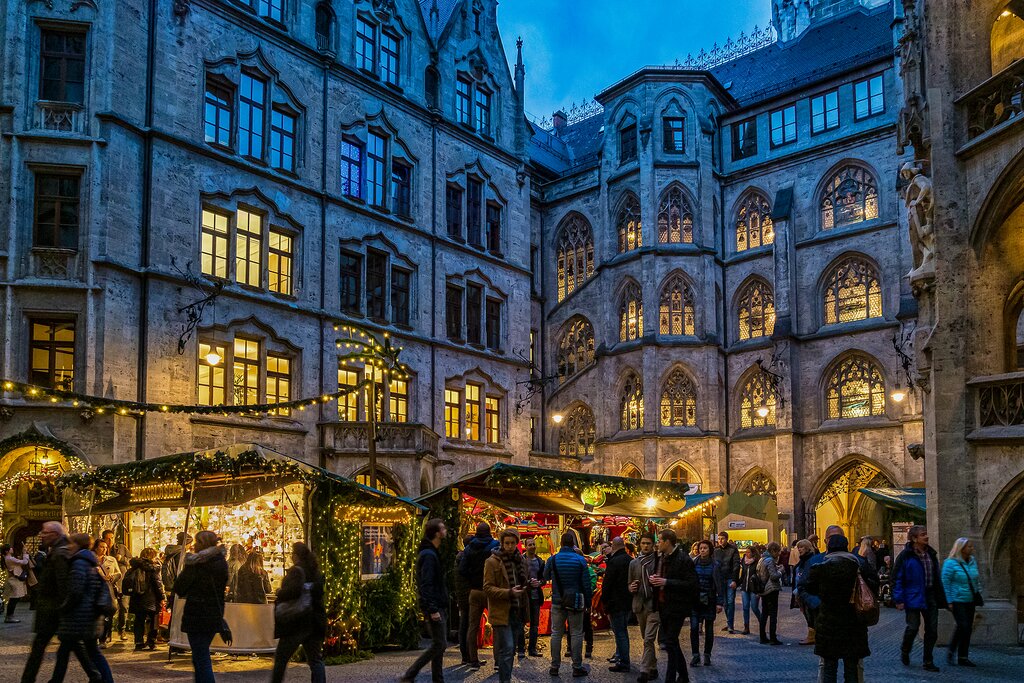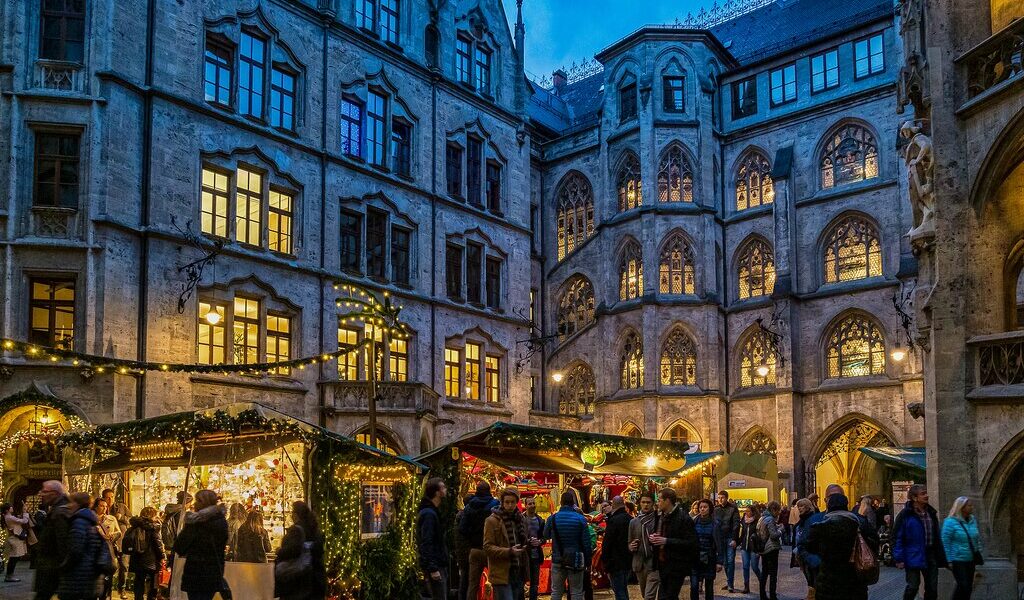
December in Germany is that special time of year when charming outdoor markets, or Christkindelsmarkt, pop up across the country. You won’t have to travel far to find gingerbread and Glühwein from Hamburg down to the Austrian border in the shadow of the mighty Zugspitze (Germany’s tallest peak). While you’re in the Bavarian Alps, head to the lively ski resorts, which open this month just in time for the holidays.
## Germany in December: A Winter Wonderland Awaits
December in Germany is a truly enchanting time, a period where the air crackles with festive cheer and the scent of gingerbread and Glühwein hangs heavy in the air. However, it’s a time that demands preparation, especially when it comes to your wardrobe. Don’t even think about scrimping on warm clothing. While winter officially announces its arrival on December 21st, the shift in seasons is felt much earlier in Germany. The weather turns colder, and overcast skies become the norm. Expect more frequent rainfall compared to November, and, with a bit of luck, you might even witness the magical snowfall that blankets the landscape, particularly in the higher altitudes surrounding Germany’s numerous ski fields and resorts which eagerly open their doors this month. Daylight hours become precious commodities. Sunrises are a late affair, occurring around 8 am, while sunsets bid adieu as early as 4 pm. These shorter days create the perfect ambiance for bundling up warmly and embarking on delightful excursions to photograph the dazzling holiday lights that adorn the enchanting Christmas markets.
It’s important to remember that Germany isn’t a monolith when it comes to weather. There are subtle, yet noticeable, differences depending on your chosen destination. Temperatures in Berlin, the dynamic and historically rich capital of the nation, typically see an average daily high of 39°F (4°C), with lows dipping to around 32°F (0°C). In the southwestern region of Germany, the climate tends to be a bit more forgiving, less relentlessly frigid. Consider Frankfurt, for example. Here, you can expect an average daily high of 43°F (6°C) and a low of 34°F (1°C) during the month of December. Venture south towards the majestic Bavarian Alps, and you’ll encounter towns like Garmisch-Partenkirchen, where the higher elevations contribute to a colder climate. Lows here average around 23°F (-5°C). Conversely, the northern coast of Germany experiences a milder and wetter climate, influenced by the proximity of the North and Baltic Seas. This coastal climate adds another layer of complexity when planning your trip and requires different clothing considerations.
December is a tremendously popular month for travel to Germany, a fact reflected in a noticeable increase in both prices and the size of the crowds. While the peak tourist season generally occurs during the summer months (from late June to late August), Germany boasts a unique travel landscape characterized by several “mini” high seasons. One such period is late September, fueled by the world-renowned Oktoberfest. And then, of course, there’s December. During this festive month, millions of visitors flock to Germany’s captivating Christmas markets. The most sought-after destinations are often cities and towns that combine the allure of ski resorts with the irresistible charm of famous Christmas markets. The key takeaway here is planning. It’s highly recommended to book your flights, accommodations, and rental cars well in advance to secure your preferred options. Furthermore, if you have your heart set on experiencing particular activities or dining at specific restaurants, making reservations in advance is crucial to avoid disappointment.
Germany truly excels at cultivating a strong holiday spirit. Thousands of Christmas markets spring to life across the country, each one overflowing with traditional hand-carved decorations, fragrant cups of warming Glühwein (mulled wine), and a delectable array of treats, from sweet crepes to traditional stollen fruitcakes. Consider beginning or concluding your German adventure in Berlin, a city that never fails to impress. Berlin transforms into an exceptionally festive wonderland during this time of year, boasting an impressive collection of approximately 80 Christmas markets scattered throughout the city. It’s also a fantastic place to delve into historical sights and explore diverse neighborhoods, ranging from upscale and elegant to trendy and hipster. To ensure comfortable exploration in the sometimes-chilly weather, reserving a hotel near a U-Bahn (subway) station is a smart move, allowing you to warm up conveniently between long days of sightseeing and market hopping.
From Berlin, a variety of day trips to nearby smaller cities are easily accessible. Consider a visit to Dresden, a city steeped in history and home to Germany’s oldest Christmas market. Dresden’s stunning Renaissance and Baroque architecture, meticulously restored after the devastation of World War II, provides a breathtaking backdrop to the festive atmosphere. Alternatively, you can hop on a train from Berlin to Hamburg and immerse yourself in the rich history of this Hanseatic port city. Explore its UNESCO-listed warehouse district, a testament to its maritime past. And, naturally, you’ll find enchanting Christmas markets here as well. Hamburg also offers a delightful outdoor fun fair (more on that later), a popular attraction for families seeking additional festive entertainment.
The southern state of Bavaria presents a different, yet equally captivating, holiday experience. Here, you’ll discover a wealth of charming Christmas markets set against the stunning backdrop of snow-capped mountains (more often than not), picturesque lakes, and fairy-tale castles, depending on the specific region you choose to explore. After experiencing Munich‘s renowned Christmas market in Marienplatz, with its regular music performances adding to the festive ambiance, take a train to charming resort towns like Garmisch-Partenkirchen. Here, you’ll find delightful wooden booths overflowing with unique gifts and tasty treats, all framed by the majestic presence of the Alps. Another option is to embark on a scenic drive along Bavaria’s famed Romantic Road, visiting the captivating markets nestled in medieval villages like Rothenburg ob der Tauber, known for its charming half-timbered houses and winding cobbled lanes.
Frankfurt boasts one of the oldest Christmas markets in Germany, steeped in tradition and historical significance. It also houses the oldest independent Jewish museum in the country, offering a glimpse into the region’s rich cultural heritage. From Frankfurt, you can easily take a train to Cologne to visit its impressive Christmas market, which is set against the backdrop of the iconic Gothic cathedral, one of the largest in Northern Europe. Alternatively, you can rent a car and head to Heidelberg‘s romantic Christmas market, complete with a festive ice skating rink and a 13th-century castle overlooking the scene. From Heidelberg, continue driving to the chic spa town of Baden-Baden, where you can indulge in relaxing thermal baths. Further south, you’ll find the vibrant university city of Freiburg, which offers a funicular ride providing panoramic views of the breathtaking Black Forest and, of course, a charming Christmas market to complete the experience.
Germans have a deep appreciation for the outdoors, and you’ll find just as many locals participating in the December festivities as tourists, all before the quieter month of January arrives. However, the allure of Germany in December extends far beyond just the Christmas markets.
The ski season in the mountains and Alps kicks into high gear around Christmas, offering a wide range of activities. Many resorts provide downhill ski runs for seasoned skiers, cross-country trails for those seeking a more leisurely pace, tobogganing for family fun, snowshoeing for exploring the winter landscape, and even ski jumping for the truly adventurous. You can also try your hand at curling, a popular winter sport, or bundle up warmly and enjoy a romantic horse-drawn carriage ride through the snow-covered scenery. Consider taking guided tours of glaciers or exploring historic castles, or simply relax and enjoy the breathtaking views from a gondola ride, particularly from the viewing platform overlooking the majestic Zugspitze. From the charming town of Füssen, you can easily don a pair of winter hiking boots and embark on a scenic walk across the border into Austria.
If you plan on visiting Berlin‘s key sights, such as the iconic Brandenburg Gate, the poignant Berlin Wall Memorial, the historic Checkpoint Charlie, and the five world-class museums located on Museum Island, including the renowned Pergamon Museum with its life-size reconstructions of ancient wonders, be prepared for crowds. You can also visit the Reichstag, Germany’s parliament building, which was bombed during World War II and subsequently rebuilt with its iconic glass dome, a symbol of Berlin’s reunification. Most cities across Germany offer ice skating rinks during the winter months, often more than one. Berlin, for example, boasts an ice rink called Lankwitz, which features a lively disco theme every Saturday. Dresden, on the other hand, offers a more classic ice skating experience in the picturesque courtyard of the Palais Taschenberg.
Hamburg has evolved into an increasingly cosmopolitan city, and you can easily dedicate a full day to exploring its intricate network of canals and bridges, capturing the city’s unique beauty with your camera. Take breaks to warm up in the city’s diverse museums, such as the Hamburger Kunsthalle, widely regarded as one of the best places in Germany to admire Renaissance art. In the evening, indulge in a sophisticated cocktail at a classy lounge before attending a captivating concert performance at the Elbphilharmonie, a stunning architectural masterpiece with its unique curved glass structure designed by Herzog & de Meuron. For a truly special experience this month, consider securing a ticket to Handel’s “Messiah.”
**Events in December:**
**Christmas Markets, Nationwide.** Germany is famous for its Christmas markets and rightly so. These traditional markets can be found in almost every town and city, and are well worth a visit. They usually start at the end of November with Advent and continue up to Christmas itself, though some stay open into the New Year.
**Hanukkah, Nationwide.** Germany’s Jewish community comes together to celebrate Hanukkah with events held all over the country. In Berlin, see the largest menorah in Europe standing proudly in front of the Brandenburg Gate.
**St. Nicholas Day, Nationwide.** On the night of December 5th, children all over Germany prepare for St. Nicholas’ visit. They polish their boots and leave them outside the door, excitedly awaiting the goodies St. Nicholas will fill them with during the night.
**Winter DOM Fest, Hamburg.** This open-air festival in Hamburg dates back to the 14th century and remains a popular attraction for families. Enjoy amusement rides, concerts and weekly firework displays. The Winter Dom Fest is one of several DOM festivals which take place across the seasons.
**Christmas Eve, Nationwide.** Christmas Eve is a very special day in Germany. Families gather together, decorate their trees and exchange gifts. Remember to do your shopping in advance, as many shops and markets close midday.
**Christmas Day and Boxing Day, Nationwide.** Both are public holidays in Germany. Many businesses will be closed on these days.
**New Year’s Eve, Nationwide.** New Year’s Eve is celebrated with gusto in Germany, with celebrations often lasting well into the morning. One of the biggest celebrations takes place at the Brandenburg Gate in Berlin, where you’ll find firework displays, food stalls and drinks. For something a bit more cultural, why not check out the special concerts and plays on offer at performance theatres? Make sure to book restaurants in advance.
B-906

